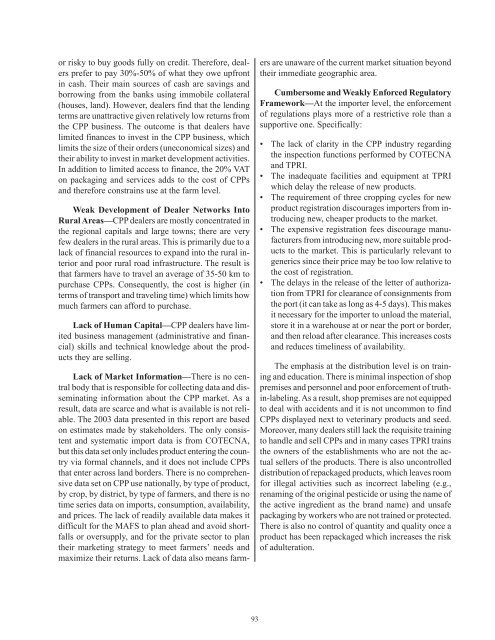An Action Plan for Developing Agricultural Input Markets in Tanzania
An Action Plan for Developing Agricultural Input Markets in Tanzania
An Action Plan for Developing Agricultural Input Markets in Tanzania
You also want an ePaper? Increase the reach of your titles
YUMPU automatically turns print PDFs into web optimized ePapers that Google loves.
or risky to buy goods fully on credit. There<strong>for</strong>e, dealers<br />
prefer to pay 30%-50% of what they owe upfront<br />
<strong>in</strong> cash. Their ma<strong>in</strong> sources of cash are sav<strong>in</strong>gs and<br />
borrow<strong>in</strong>g from the banks us<strong>in</strong>g immobile collateral<br />
(houses, land). However, dealers f<strong>in</strong>d that the lend<strong>in</strong>g<br />
terms are unattractive given relatively low returns from<br />
the CPP bus<strong>in</strong>ess. The outcome is that dealers have<br />
limited f<strong>in</strong>ances to <strong>in</strong>vest <strong>in</strong> the CPP bus<strong>in</strong>ess, which<br />
limits the size of their orders (uneconomical sizes) and<br />
their ability to <strong>in</strong>vest <strong>in</strong> market development activities.<br />
In addition to limited access to f<strong>in</strong>ance, the 20% VAT<br />
on packag<strong>in</strong>g and services adds to the cost of CPPs<br />
and there<strong>for</strong>e constra<strong>in</strong>s use at the farm level.<br />
Weak Development of Dealer Networks Into<br />
Rural Areas—CPP dealers are mostly concentrated <strong>in</strong><br />
the regional capitals and large towns; there are very<br />
few dealers <strong>in</strong> the rural areas. This is primarily due to a<br />
lack of f<strong>in</strong>ancial resources to expand <strong>in</strong>to the rural <strong>in</strong>terior<br />
and poor rural road <strong>in</strong>frastructure. The result is<br />
that farmers have to travel an average of 35-50 km to<br />
purchase CPPs. Consequently, the cost is higher (<strong>in</strong><br />
terms of transport and travel<strong>in</strong>g time) which limits how<br />
much farmers can af<strong>for</strong>d to purchase.<br />
Lack of Human Capital—CPP dealers have limited<br />
bus<strong>in</strong>ess management (adm<strong>in</strong>istrative and f<strong>in</strong>ancial)<br />
skills and technical knowledge about the products<br />
they are sell<strong>in</strong>g.<br />
Lack of Market In<strong>for</strong>mation—There is no central<br />
body that is responsible <strong>for</strong> collect<strong>in</strong>g data and dissem<strong>in</strong>at<strong>in</strong>g<br />
<strong>in</strong><strong>for</strong>mation about the CPP market. As a<br />
result, data are scarce and what is available is not reliable.<br />
The 2003 data presented <strong>in</strong> this report are based<br />
on estimates made by stakeholders. The only consistent<br />
and systematic import data is from COTECNA,<br />
but this data set only <strong>in</strong>cludes product enter<strong>in</strong>g the country<br />
via <strong>for</strong>mal channels, and it does not <strong>in</strong>clude CPPs<br />
that enter across land borders. There is no comprehensive<br />
data set on CPP use nationally, by type of product,<br />
by crop, by district, by type of farmers, and there is no<br />
time series data on imports, consumption, availability,<br />
and prices. The lack of readily available data makes it<br />
difficult <strong>for</strong> the MAFS to plan ahead and avoid shortfalls<br />
or oversupply, and <strong>for</strong> the private sector to plan<br />
their market<strong>in</strong>g strategy to meet farmers’ needs and<br />
maximize their returns. Lack of data also means farm-<br />
93<br />
ers are unaware of the current market situation beyond<br />
their immediate geographic area.<br />
Cumbersome and Weakly En<strong>for</strong>ced Regulatory<br />
Framework—At the importer level, the en<strong>for</strong>cement<br />
of regulations plays more of a restrictive role than a<br />
supportive one. Specifically:<br />
• The lack of clarity <strong>in</strong> the CPP <strong>in</strong>dustry regard<strong>in</strong>g<br />
the <strong>in</strong>spection functions per<strong>for</strong>med by COTECNA<br />
and TPRI.<br />
• The <strong>in</strong>adequate facilities and equipment at TPRI<br />
which delay the release of new products.<br />
• The requirement of three cropp<strong>in</strong>g cycles <strong>for</strong> new<br />
product registration discourages importers from <strong>in</strong>troduc<strong>in</strong>g<br />
new, cheaper products to the market.<br />
• The expensive registration fees discourage manufacturers<br />
from <strong>in</strong>troduc<strong>in</strong>g new, more suitable products<br />
to the market. This is particularly relevant to<br />
generics s<strong>in</strong>ce their price may be too low relative to<br />
the cost of registration.<br />
• The delays <strong>in</strong> the release of the letter of authorization<br />
from TPRI <strong>for</strong> clearance of consignments from<br />
the port (it can take as long as 4-5 days). This makes<br />
it necessary <strong>for</strong> the importer to unload the material,<br />
store it <strong>in</strong> a warehouse at or near the port or border,<br />
and then reload after clearance. This <strong>in</strong>creases costs<br />
and reduces timel<strong>in</strong>ess of availability.<br />
The emphasis at the distribution level is on tra<strong>in</strong><strong>in</strong>g<br />
and education. There is m<strong>in</strong>imal <strong>in</strong>spection of shop<br />
premises and personnel and poor en<strong>for</strong>cement of truth<strong>in</strong>-label<strong>in</strong>g.<br />
As a result, shop premises are not equipped<br />
to deal with accidents and it is not uncommon to f<strong>in</strong>d<br />
CPPs displayed next to veter<strong>in</strong>ary products and seed.<br />
Moreover, many dealers still lack the requisite tra<strong>in</strong><strong>in</strong>g<br />
to handle and sell CPPs and <strong>in</strong> many cases TPRI tra<strong>in</strong>s<br />
the owners of the establishments who are not the actual<br />
sellers of the products. There is also uncontrolled<br />
distribution of repackaged products, which leaves room<br />
<strong>for</strong> illegal activities such as <strong>in</strong>correct label<strong>in</strong>g (e.g.,<br />
renam<strong>in</strong>g of the orig<strong>in</strong>al pesticide or us<strong>in</strong>g the name of<br />
the active <strong>in</strong>gredient as the brand name) and unsafe<br />
packag<strong>in</strong>g by workers who are not tra<strong>in</strong>ed or protected.<br />
There is also no control of quantity and quality once a<br />
product has been repackaged which <strong>in</strong>creases the risk<br />
of adulteration.

















